Labour-saving innovations help Scottish grower in post-Brexit world
18th June 2024
Tim Stockwell, who farms 80ha of soft fruit in Fife, has invested in labour-saving tools to help the farm cope, not only with the cost of labour, but also lack of availability since Brexit – which he says has particularly limited the number of seasonal workers with managerial skills. Deputy editor Sarah Kidby spoke to Tim to find out more about the farm’s fruit growing enterprise.
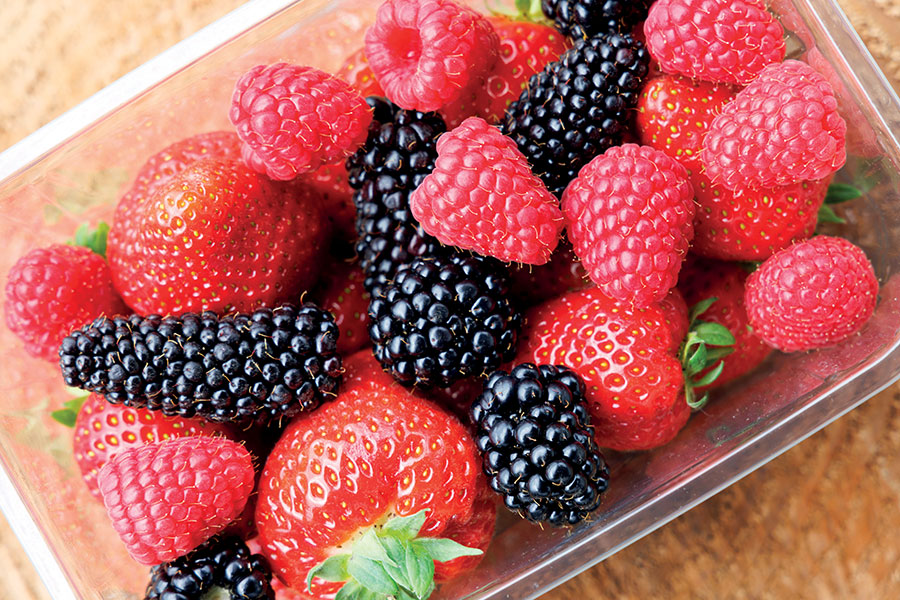
Barnsmuir Farm has been owned and run by the Stockwell family since 1990, when they moved to Scotland from the South of England and started farming vegetable and cereal crops. Tim Stockwell and his brother took over the running of the farm from their parents, with Tim concentrating on the soft fruits and Rob on the vegetable enterprise.
Fruit growing began with strawberries in 2005, to make use of the casual labour which was already being utilised for the vegetable and cereal crops.
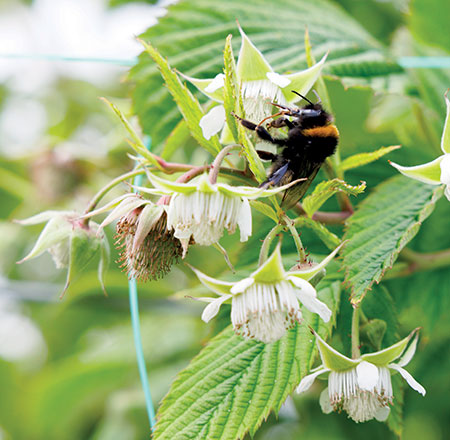
Feeling that there was room for growth, Barnsmuir has since expanded into other fruits – raspberries, blackberries and blueberries – which helps to extend the season and give an even profile of labour with blueberries being late season. Delving into new fruits allowed them to expand their existing business, rather than starting a completely new enterprise, Tim explained.
The farm’s year starts with husbandry jobs in early January, such as pruning blueberry bushes, and planting and trimming strawberry plants. Picking begins with strawberries in April, followed by raspberries, blackberries and finally blueberries, which finish in November. Blueberries were first planted around 10 years ago and the return was initially quite good, though it takes 3–4 years to get a decent crop. However, blueberry prices have not been particularly good recently due to the large quantities of imports, Tim said.
Variety choice
The farm’s fruit is packed on-site, marketed though Angus Soft Fruits, and goes into M&S, Sainsbury’s, ASDA and Morrisons. Tim’s wife Alice Stockwell uses some of the farm’s waste fruit to make jams, chutneys and fruit cordials to sell at local farmers’ markets and in the farm shop, which also sells fresh produce.
Flavour and shelf life are key to the farm’s variety choices, especially for fruit destined for the premium supermarkets, Tim explained, and waste reduction is an important element. Varieties are also selected for their resistance to mildew, which is a constant threat.
Barnsmuir is now growing a new raspberry variety, Ava Monet, which entered commercial production this year in response to mounting cost pressures on growers. Developed by the Angus Soft Fruits breeding programme, Ava Monet has short, compact laterals. Yield, crop management and picking costs were a major focus in the variety’s development, according to the breeding programme director, Lucy Wilkins. It produces larger berries that are easier to access, making picking easier, as well as offering high yields (1.4kg per cane in the UK) and nine days’ shelf life from harvest. Ava Monet is a late primocane variety but at Barnsmuir and other fruit farms in Scotland, it is grown using long canes due to the success of this technique north of the border.
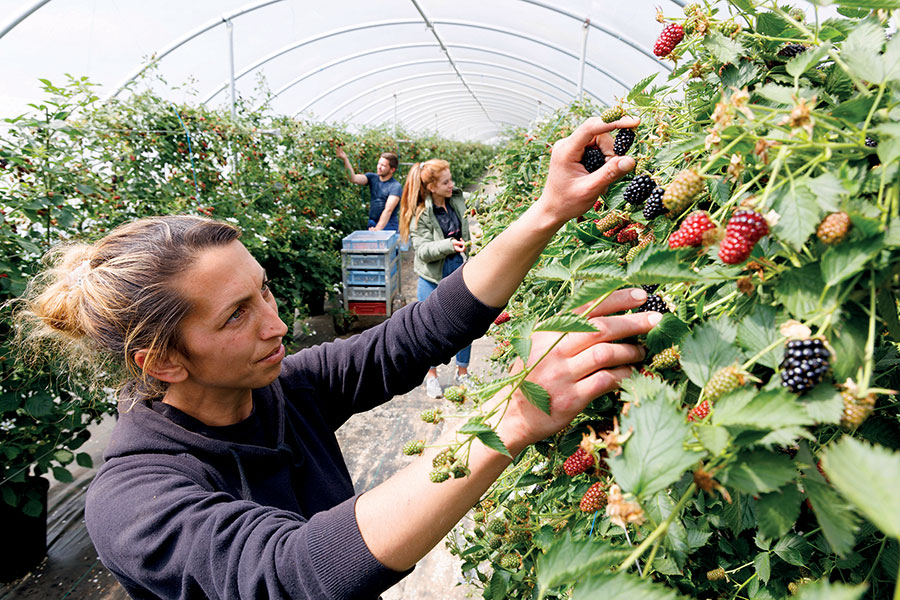
Other varieties grown:
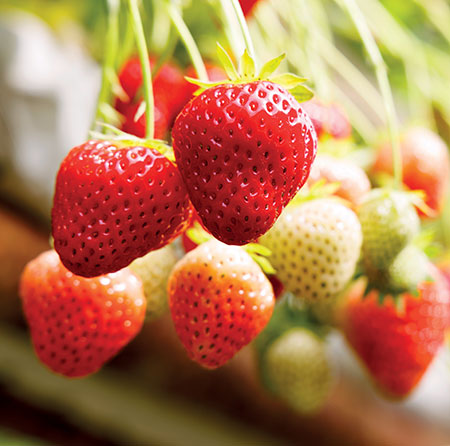
Strawberries: Magnum is a June-bearing variety that is described as ideally suited to the mild Scottish climate, where long summer days result in exceptionally sweet berries. Aurora Karima is everbearing and offers high yields, a juicy texture with a fresh taste, good shelf life and high disease tolerance. Meanwhile, Falco produces large strawberries in the mid-season. It is a very robust variety, remaining firm even during warm conditions, as well as good botrytis tolerance, according to the breeder.
Raspberries: Italian variety Lagorai is a late autumn variety and known for its high yield. The plant is very vigorous and has short laterals, meaning it is easy to pick.
Blackberries: Barnsmuir grows Sweet Royalla which is a thornless variety with a juicier flavour and larger berries than average. Plants have strong roots and a higher harvesting performance, plus low susceptibility to fruit rot and mildew.
Blueberries: The farm grows Last Call blueberries, which are very late season, producing high yields of large berries with a classic sweet and slightly aromatic blueberry flavour.
Success with biologicals
With growers facing the withdrawal of many chemicals for controlling pests and disease, Barnsmuir has turned to biological pest controls, which are reintroduced every year, and they have had some success with these, particularly in resisting thrip fly. A biological supply company also provides bees for pollination in the polytunnels, and the farm has five of its own bee hives on site which produce honey for the farm shop.
Locations for growing certain soft fruits are carefully selected to ensure the best growing conditions in terms of temperature, Tim added. The cooling breeze from the nearby sea is an added benefit. Early season soft fruits are grown in heated polytunnels and crops susceptible to frost damage are grown in tunnels that are located close to the sea where there is less risk.
Labour issues
The farm’s primary task is managing the workforce, to ensure seasonal workers arrive at the right time. The farm currently employs around 300 workers per year via the Seasonal Agricultural Workers Scheme, and it has around 10 permanent staff.
As is the case for all growers, labour is a challenge for a number of reasons. For Barnsmuir, a major difficulty since Brexit and the loss of many Eastern European workers, has been the lack of managerial or supervisor level staff – plus, the limited amount of time that seasonal workers are able to stay under the visa scheme.
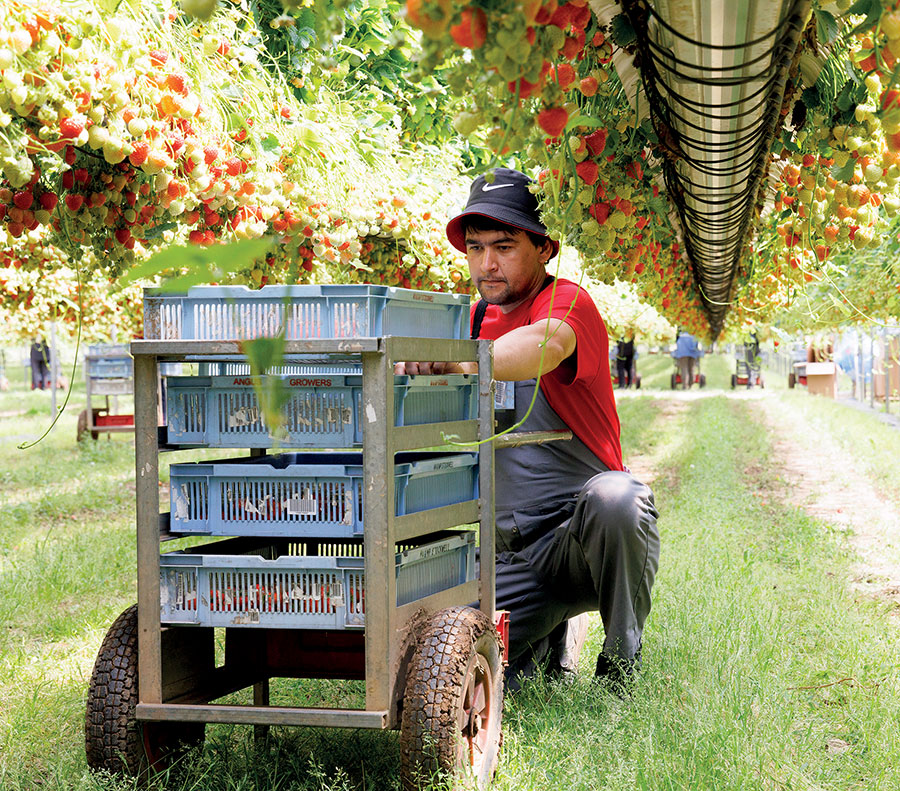
Machinery on the farm is bought either new or secondhand, depending on cost and availability and Tim makes use of labour-saving machinery where possible. For example, a biological applicator that blows predatory insects over the top of the crops is used in the polytunnels to reduce the labour cost associated with biological control. It was originally supplied by Royal Brinkman and has been mounted on a frame built in the farm’s workshop so it can be towed by a small tractor.
Barnsmuir has also invested in a Weterings grow-bag conveyor belt system for removing grow bags from polytunnels – previously they used barrows and trolleys. Explaining how the conveyor belt system works, Tim said: “You lay out a mat on the floor and [the machine] pulls it in and rolls it up, then puts the bags onto an elevator and into a trailer.”
The farm also has a wind turbine which generates power for the farm, and a biomass heating system.
Tim is keen to continue introducing new working and labour-saving methods, and this year will be involved in a project with Fox Robotics. The project, Flexbot, has been awarded £1 million from DEFRA and Innovate UK to trial a robotic transport system for berry trays in UK farms.
“I suppose we are all waiting for some sort of autonomous vehicle to come along, and obviously robotic pickers, which I believe some growers are already working with,” Tim commented. “There are machines around now that can autonomously transport fruit to the pack house or the cold store. So I see the potential of that, hopefully in the near future.”
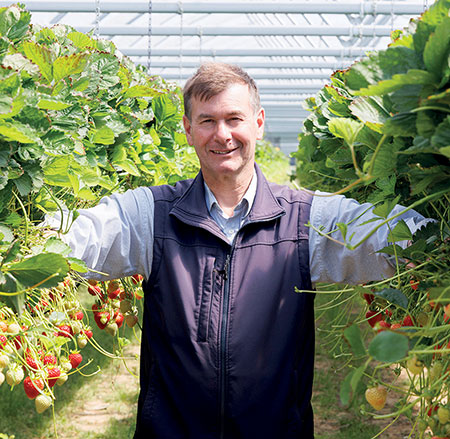
Grower profile
Farm owner: Tim Stockwell
Location: Crail, Fife, Scotland
Total farm size: 800ha
Fruit operation: 80ha
Varieties grown: Strawberries: Magnum, Aurora Karima, Falco. Raspberries: Lagorai, Ava Monet. Blackberries: Sweet Royalla. Blueberries: Last Call
Soil type: Sandy loam
Groundbreaking project trials autonomous robots on farm
Fox Robotics Ltd says it is at the forefront of technological advancement in agriculture, “revolutionising the industry” with its leading logistical robot solution – Hugo RTTM.
In autumn 2023, Fox, in collaboration with the University of Surrey and the Agri-Epi Centre, along with three prominent farms was awarded a grant of nearly £1m for its ground-breaking Flexbot project, from Defra and Innovate UK.
Fox Robotics developed the Hugo RT (Rough Terrain) robot, which can transport fruit at harvest, as well as performing other essential tasks such as mowing and transporting soil and handling delicate seedlings outside the growing season. From Q2 2024, Hall Hunter Partnership has joined the project and taken over Secretts Farm’s scope in the Flexbot project. This initiative aims to trial autonomous robots on farms, addressing critical labour shortages and enhancing productivity.
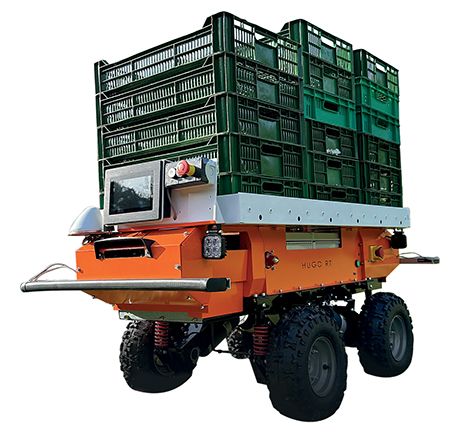
Introducing Hugo RT
The Hugo RT robot is designed to meet the diverse needs of horticulture farms. According to Fox, it is versatile and robust, capable of transporting fruit during harvest, mowing, spraying, and even security patrolling outside the growing season. Its all-terrain capabilities and autonomous navigation make it an indispensable tool for modern agriculture, Fox says.
The Hugo RT robot’s unique ability to perform tasks without human intervention significantly eases growers’ labour challenges by automating logistics operations, the company continues. This allows fruit pickers to focus on the intricate task of harvesting delicate fruit, thereby increasing daily yields, reducing waste, and boosting profits.
According to Fox, the implementation of Hugo RT can lead to a 20% increase in overall productivity for growers.
Advanced tech for farm environments
The Flexbot project is currently being trialled on multiple farms, including Barnsmuir Farm in Scotland and Hall Hunter Partnership Farms in Surrey. Scientists from the University of Surrey are enhancing the AI system used by Hugo RT to navigate complex farm environments. This advanced system employs outward-facing cameras to create a bird’s eye view, ensuring collision avoidance and smooth operation in busy farm settings.
The project’s core objective is to enhance the robustness of the Hugo RT robot’s navigation system, ensuring it can operate autonomously even in the most bustling and dynamic farm environments.
Traditional navigation systems have struggled with the challenges of autonomously moving robots into polytunnels and around essential items. Hugo RT overcomes these obstacles with precise mapping and autonomous navigation, making it a reliable solution for various agricultural contexts, including husbandry, fruit, and flower farming.
Another of the Hugo RT robot’s standout features is its scalability. Fox Robotics has designed the robot to adapt to varying farm sizes and layouts, offering farmers the flexibility to optimise resource distribution and field planning.
The Hugo RT robot’s specifications for maximum efficiency:
- Carrying capacity: 200kg
- Towing capacity: 500kg
- Weather-proof design
- Interchangeable table and weighing table
- Passive suspension
- Two removable and rechargeable batteries
- 3G and 4G capability
- Dimensions: Length 107cm, width 63cm
- Top speed: 3m/s.
Christian Gordon-Pullar, chairman of Fox Robotics, emphasised the collaboration’s goal: “The aim of this collaboration is to enhance technology that simplifies the adoption of robotics in agriculture. By mitigating the complexities associated with advanced technology manipulation, we empower farmers to harness the benefits of robotics without the need for extensive technical expertise.”
Duncan Ross, business development manager for crops and horticulture at Agri-EPI Centre Ltd, added: “Fruit growers are interested in tech innovations that address seasonal labour shortages. While picking robots are still evolving, robotic platforms like Hugo RT, which can move fruit and crates, allow pickers to focus on harvesting. This project aims to foster increased on-farm adoption of such solutions.”
Read more fruit news
Read more grower profiles
